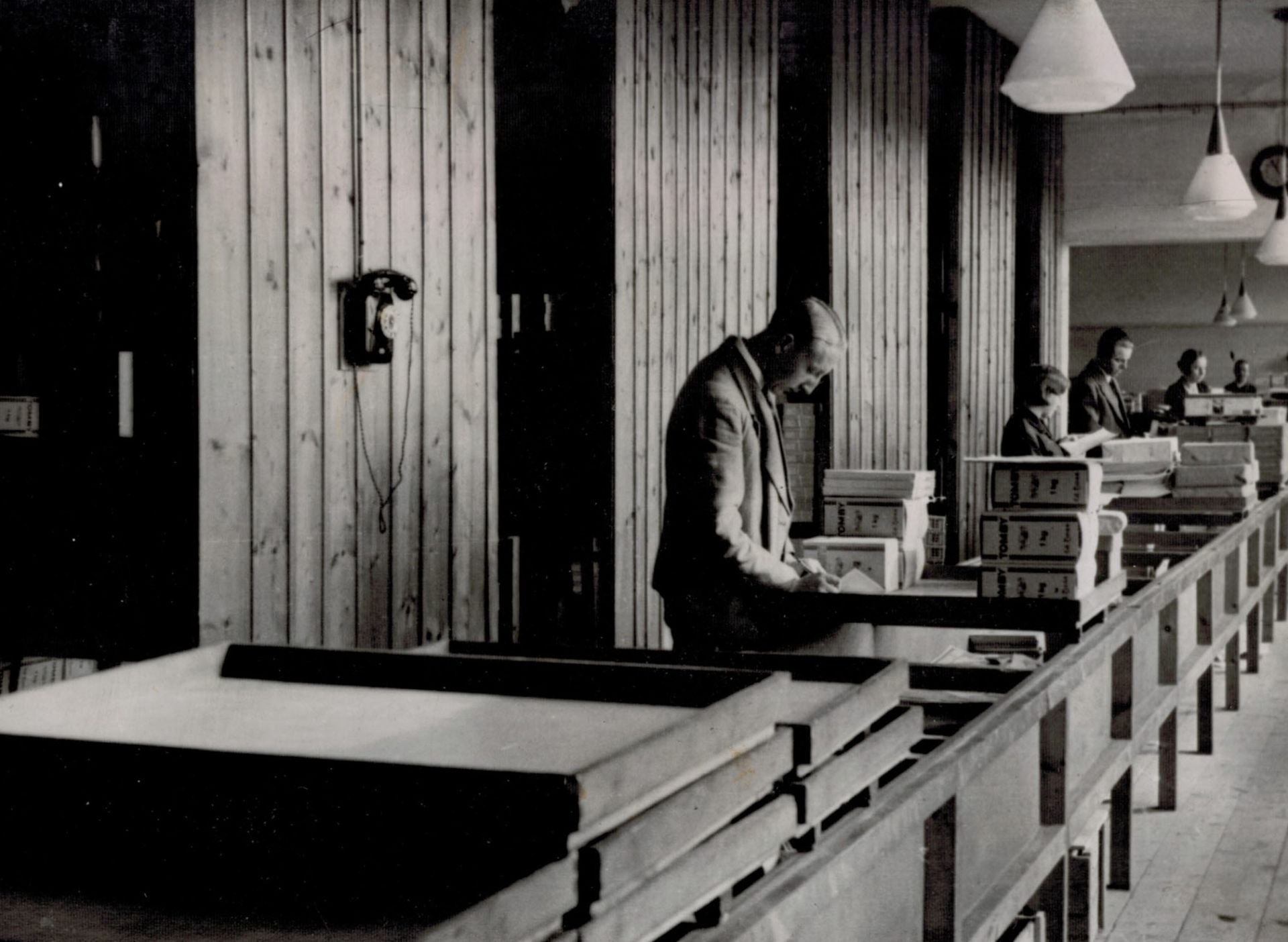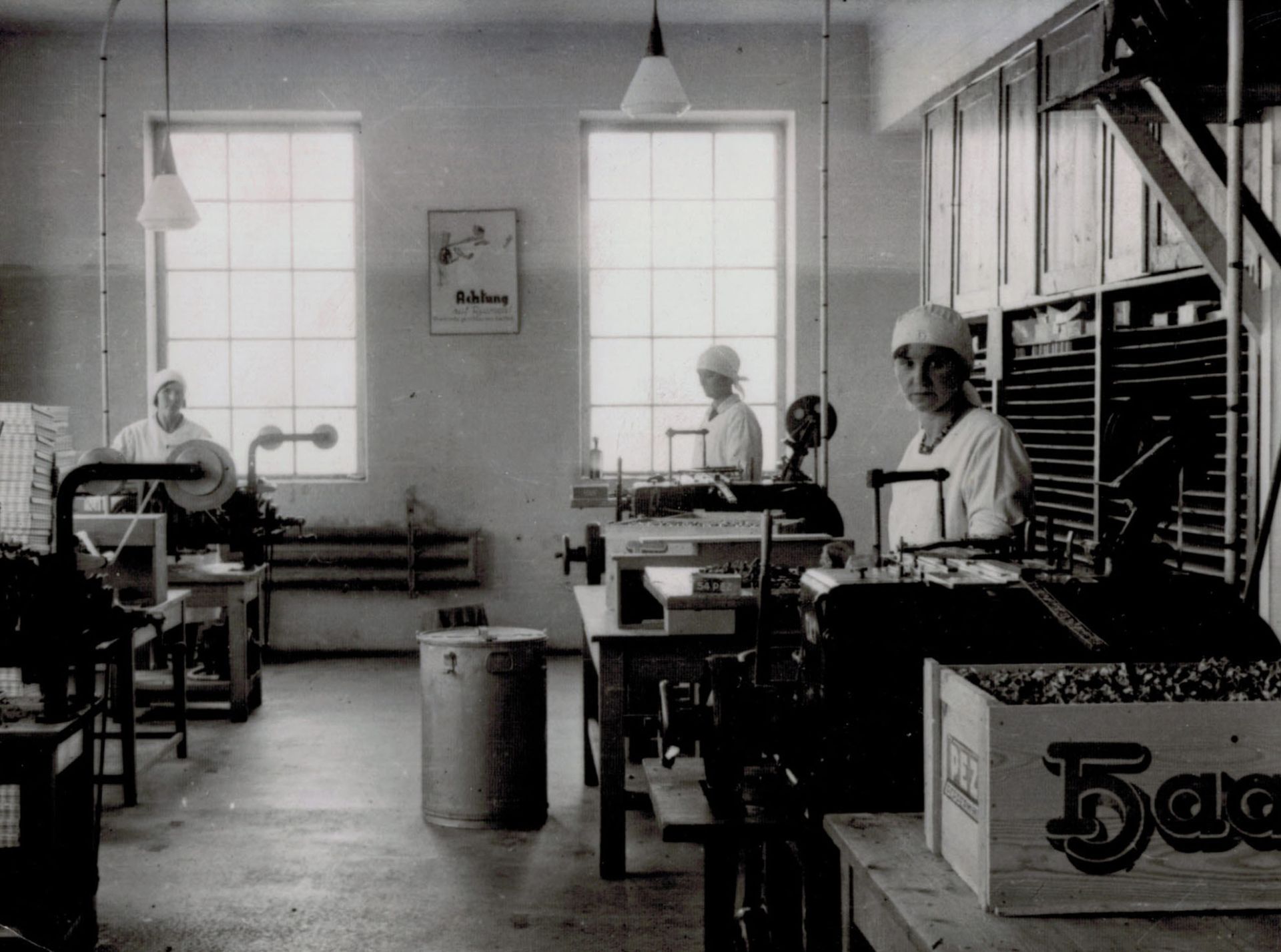At the end of 1902, Julius Pollak rented a spacious room at Janův Důl No. 76 where he began producing baking powder and other aromatic ingredients using a rather primitive method. In 1912, encouraged by his early success, Julius Pollak got together with an entrepreneur from Linz, Eduard Hass, to establish Zaječí závody Hass a Pollak. It was then they began expanding the existing inventory, taking up production of sherbet and compressed sugar.
In 1923, Julius Pollak stepped down as a partner, with the company being renamed to Zaječí podniky, továrna poživatin, owned by Eduard Haas. The well-managed plant quickly grew, with further additions made to the production portfolio, especially the so-called compressed goods, which Eduard Haas began marketing IN 1927 under the PEZ mark, which remains globally well-known to this date.
In 1928, the company bought the former A. E. Friedlander belt factory in Liberec at Ruprechtická No. 32, where it launched its machinery production programme and built a sales organisation under the name Továrna poživatin (Foodstuff Factory), Eduard Haas, Liberec.




Further additions were gradually made to the production and product range, which already consisted of a considerable number of various types of products, although they were produced in rather small quantities. Manual packing was replaced by machine packing, with packing machines imported from Switzerland and Germany.
The most extensive production programme was that of hard candies - soft-centred and drops, as well as toffees, fondants, jelly and--to a lesser extent--compressed goods, dragees, sherbet, baking powder, vanilla sugar, coffee substitutes, and preservation products. Chocolate was also produced, although in rather small quantities of up to 300 kg a day, mainly coated types, and seasonally even Christmas chocolate boxes, all in a very primitive and laborious manner.
As the production grew, new buildings were added and the existing ones extended, and after hard candy production was introduced, an annex was added to the existing factory site, consisting mainly of the the modern boiler room. About 200 people were employed by the plant, which had roughly 13,000 German and 17,000 Czech customers. The size of production is best attested to by the fact that a mere three shipping employees managed to dispatch the entire output on their own, mostly by post consignments.


After the liberation in 1945, national administration was installed. At that time, the production mix remained relatively unchanged in terms of both range of products and quantity.

In 1948, the Haas company was nationalised and, after two smaller plants and business locations were added to it, a new state-owned company, Poživatina (Foodstuff), was established with its registered address in Liberec, consisting of 12 plants. As a result of gradual specialisation and concentration of the production, only three plants remained: Liberec, Chotyně and Dvůr Králové.

After 1964, only the Liberec plant remained in existence, renamed to LIPO (an acronym for 'Liberec Foodstuffs'), to be absorbed by Čokoládovny, o.p. Prague departmental enterprise later on. As the plant evolved, the product range was subject to still narrower specialisation with the production technology gradually modernised to finally reach its current form.




In 1992, the entire Čokoládovny, o.p. Prague departmental enterprise was privatised, with Čokoládovny, a.s. formed as a new economic operator using property investments by Nestlé and BSN (later renamed to Danone) and with the former LIPO branch plant becoming a part of the new enterprise.
At the end of the 90s, the Čokoládovny a.s. joint-stock company was divided between the two main shareholders. The Chocolate and Candy Division, of which the LIPO plant was a part was assigned to the Nestlé concern.
On 1 August 2000, Nestlé Česko sold the LIPO Liberec plant to a newly established joint-stock company. The company resumed production of non-chocolate-based candy. Nestlé Česko remained one of the customers although the overwhelming majority of products were dispatched to foreign markets, not only within Europe, but also to such countries as Saudi Arabia, Kuwait, Yemen, Korea, Australia.




During the first half of 2006, the production halls were re-equipped with technologies for the production of compressed candy and dragees. Gradually, the company began to renew the production of non-chocolate confectionery with the aim of continuing the 100-year tradition of confectionery production in the region. In the same year, MOCCA, spol. s r.o. received the IFS and ISO 9001 quality certificates.
In 2009, the production of chocolate dragees began, which for the next two years was produced in the plant only for a multinational company. A year later, the company purchased technology for the production of biscuits and wafers. This production was operated for the next three years and supplied dia wafers and spa wafers to the CZ/SK market. Both the production of chocolate dragees and the production of wafers and biscuits were gradually discontinued and replaced by new production. Specifically, it was sugar-free compressed candy, and since 2014, the plant has had a modern line for the production of extruded jelly, which is gradually being modernized even more. The production of extruded jelly was such a key element that for the next few years, the management decided to expand and modernize only the established production. This began a major renovation and modernization of the production park, repair of production halls, warehouses, adjacent areas and installation of a new information system.
Nowadays, the plant is largely modernized and uses modern production technologies in the field of extruded jelly production, tablet pressing and coating. In the coming years, the company plans to maintain this modernization trend and expand both the production portfolio and production capacities, which are already one of the largest in Europe.